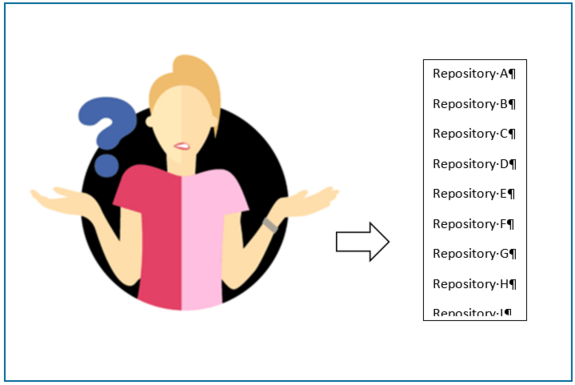Finding a suitable repository to deposit research data is a difficult task for researchers since the landscape consists of thousands of repositories and automated tool support is limited. Machine-actionable DMPs can improve the situation since they contain relevant context information in a structured and machine-friendly way and therefore enable automated support in repository recommendation. For example, by showing on relevant repositories that comply with a selected license and access mode.
At the IDCC20 conference in Dublin, opens an external URL in a new window, Tomasz Miksa presented a paper that deals with this topic. The paper entitled “Finding a repository with the help of machine-actionable DMPs: opportunities and challenges” describes the current practice of repository selection and the available support today. It also outlines the opportunities and challenges of using machine-actionable DMPs to improve repository recommendation.
The paper is a result of a visit of Simon Oblasser, opens an external URL in a new window (former TU Wien, Research Unit of Information and Software Engineering) at the National Institute of Informatics in Japan that resulted in further collaboration on the topic of repository recommendation. The paper is relevant in view of the developments made in the FAIR Data Austria project that is building infrastructure to support TU Wien researchers in making their data FAIR, opens an external URL in a new window.
Further reading
Simon Oblasser, Tomasz Miksa, & Asanobu Kitamoto. (2020, March). Finding a repository with the help of machine-actionable DMPs: opportunities and challenges. Zenodo. http://doi.org/10.5281/zenodo.3701564, opens an external URL in a new window
Miksa, T., Walk, P., & Neish, P. (2019). RDA DMP Common Standard for Machine-actionable Data Management Plans.
https://doi.org/10.15497/rda00039, opens an external URL in a new window
Miksa, T., Simms, S., Mietchen, D., Jones, S. (2019). Ten principles for machine-actionable data management plans. PLOS Computational Biology 15(3). https://doi.org/10.1371/journal.pcbi.1006750, opens an external URL in a new window
Contact
Technische Universität Wien
Center for Research Data Management
Resselgasse 4 (TU Wien Bibliothek), 1040 Vienna
research.data@tuwien.ac.at
